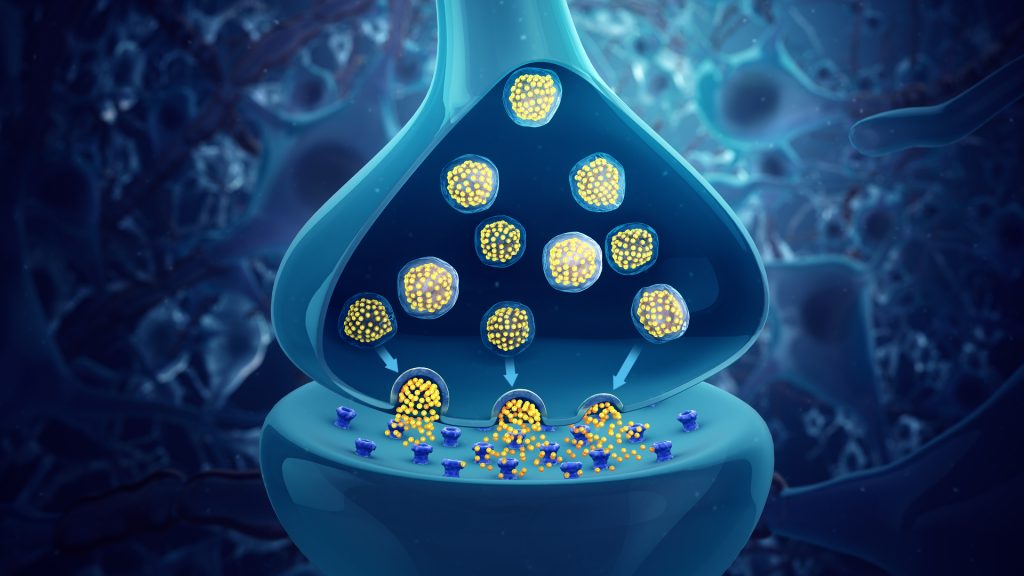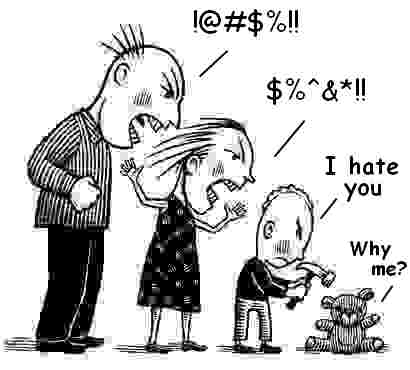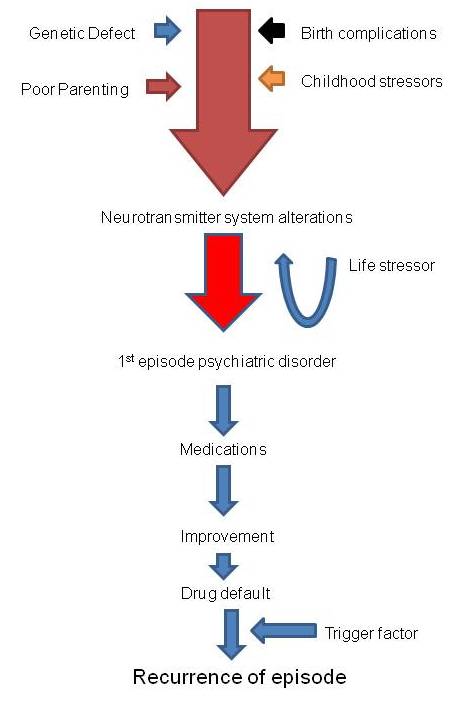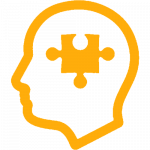Aetiology of Mental illness
There is no single cause that can be pointed to a psychiatric disorder. Like hypertension and Diabetes where multiple factors are involved, the aetiology in psychiatric disorders are due to a combination of genetic, birth complication, problems in development, personality, environment and family. Life events and stressor reduce the threshold for developing an illness; Effective coping mechanisms, sharing, positive mental health, and a healthy lifestyle protect.
In short, the aetiology is termed as “Biopsychosocial factors.”
One or more causes listed below fuses to develop a psychiatric disorder.
Genetic factors:
Genes are required for neural growth, differentiation, migration and setting up of appropriate synapse and neurotransmitters.
Abnormal genes would results in abnormal neuronal growth, inadequate migration, abnormal synaptic connections and high or low neurotransmitters release.
Thus, if one parent has schizophrenia, their son or daughter’s chance to develop schizophrenia is roughly around 8%; if both parents have such illness, the chance raise up to 50%.
Monozygotic twins share 99.9% of genes; if one develops a psychiatric illness, others’ chance to develop is up to 40%.
Illness in uncle or cousin the chance is only 5% and even less if the relation is distant.


During Pregnancy:
Viral infections in mother, especially during the second trimester of pregnancy, adversely affect the developing brain. Consuming drugs that are harmful to developing fetus, passive or active smoking, and poor nutrition affects brain growth.
Pregnancy complications:
Low birth weight, premature birth, birth asphyxia, the emergency caesarian section for any cause, preeclampsia and eclampsia.
After birth
Delayed cry, fetal anomaly, neonatal seizures, non breastfeed infant, cerebral infections, or injury adversely have an impact on brain growth.
Parenting:
A mother who has a mental illness cannot show appropriate emotional reaction and attention to the growing infant. Multiple caretakers, inadequate caring; occurring in situations when both parents are actively working. Harsh, punitive, strict upbringing leaving less scope to expression may lead to social anxiety or rebellion in future.
Development:
Delayed milestones, poor nutrition, frequent infections, seizures, head trauma during the child’s growth adversely affects the growing mind.
Personality:
The child remaining aloof does not play with peers, does not make eye contact, does not reciprocate with elders.

Family:
Single parent, single child; developing in a situation with fewer people to play with. Frequent conflicts between parents, domestic violence, chaotic evenings due to father’s alcoholism.
Environment
Living in a society with unfriendly neighbours, political refugees, a war-like situation in the state
Life style
-Early experimentation with nicotine, cannabis, alcohol
-Unhealthy eating habits leading to obesity, poor nutrition leading to anaemia, vitamin deficiency
-Lack of physical exercise overly cared child with little environmental exposure
Comorbid medical illness
Several physical illnesses have a direct and indirect impact on the mind; for example, hypothyroidism, Parkinson’s disease can cause depression in 70% of patients. Disorders of the lungs, the heart can cause anxiety disorders. The physical pain, disability, treatment costs, drug side effects of a medical disorder can adversely affect a stable mind.
Life events
Birth, death, and marriage are events in one’s life that can positively and negatively impact the person.
For example; a 13-year-old girl who lost her mother recently is highly likely to have anxiety disorders in future.

Positive life event: marriage to daughter, promotion in job, construction of the new house, expanding business, son’s education
Negative life event: retirement, divorce, loss of job, job transfers
Stressor:
Acute stressor: a fracture of leg in her husband, broken love affair, sudden business loss, detection of cancer in a family member.
Chronic stressor: bringing up a mentally retarded child.
Daily hassles: conflicts with mother in law every day, unpredictable behaviour of an alcoholic husband.
Environmental stressor: flood, famine, earthquake, Tsunami.
Political stressor: growing price rise, change of government policies, riots, civil war etc.,
Childhood stressor: death of a parent, repeated conflicts among parents, domestic violence, neglect by parents, alcoholism in father, divorce in parents, physical abuse, sexual abuse.
Neurochemical alterations
These stressors, life events have an impact on brain structures and chemicals.
There is exaggerated cell death, inefficient synaptic formation, increased synaptic pruning (cutting off), altered Neurotransmission. The Neurotransmission can be either increased or decreased, or there is less synthesis, or increased breakdown of one of them, or an altered balance of one neurotransmitter to another.
Trigger factor
An altered neurotransmitters system in the brain is susceptible to a psychological breakthrough.
Trigger factor can be a major one like the mother’s death, illness in a family member, or sometimes even a minor conflict with a neighbour, a viral fever in a child.
Example: a 30-year-old married lady, who had lost her mother in an accident when she was 13 years of age, now she heard the news that her husband had sustained a fracture in his hand when he skids from the bike. Since then, she is panicky, lost her sleep and depressed.
Past history: history of psychiatric illness in the past has high likely that it can reoccur in the future if a stressor triggers it. However mild, this stress may trigger in an appropriate environment, especially when the patient has recently stopped the medications.
Example: a 35-year-old man who had a history of acute psychosis 15 years ago lasted for a week, now had got a job abroad, upon reaching there he was not satisfied with the work, felt the agency cheated him, and now developed another episode of acute psychosis.
Drug compliance
Chronic psychiatric illness like schizophrenia, bipolar affective disorder, OCD, and recurrent depression recur if drugs have been discontinued. The recurrence can occur immediately after stopping the medications or sometimes years later. The recurrence can be spontaneous or following a trigger factor described above.
Mania kindling
A disorder like mania is known to recur, which can be prevented by regular drug compliance, failure to take drugs the episodes recur more frequently and last for many days than the previous one.

A person had mania lasting a week, followed by the death of his uncle; years later, a neighbour met with an accident he had the second episode of mania lasting for months, a few months later, he had a third episode of mania following a viral fever, and this lasted for three months, the fourth and fifth episodes were within weeks.
Thus, as the number of episodes increases, they come with a minor trigger, longer duration of illness, and resistance to treatment. The long term management is required.
Summary























